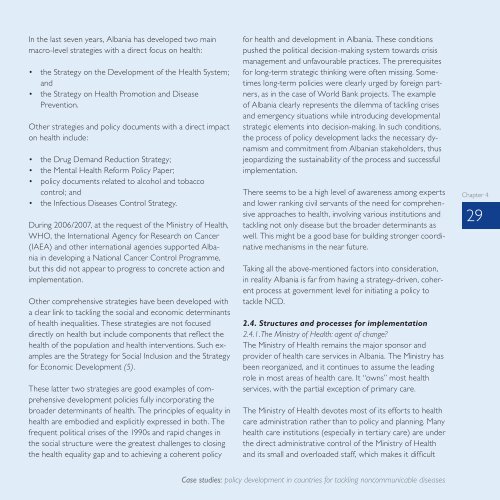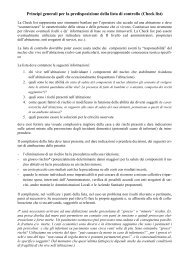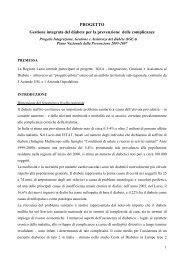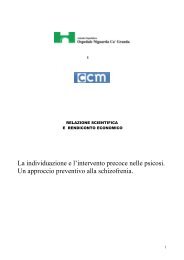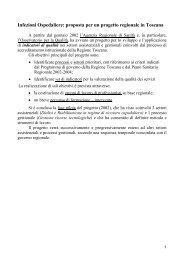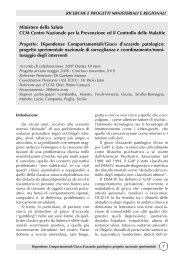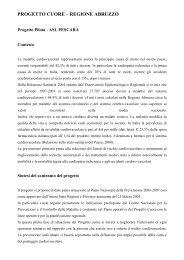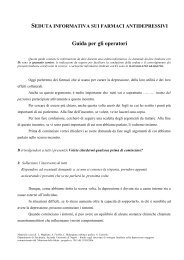Gaining health : analysis of policy development in European ...
Gaining health : analysis of policy development in European ...
Gaining health : analysis of policy development in European ...
You also want an ePaper? Increase the reach of your titles
YUMPU automatically turns print PDFs into web optimized ePapers that Google loves.
In the last seven years, Albania has developed two ma<strong>in</strong><br />
macro-level strategies with a direct focus on <strong>health</strong>:<br />
• the Strategy on the Development <strong>of</strong> the Health System;<br />
and<br />
• the Strategy on Health Promotion and Disease<br />
Prevention.<br />
Other strategies and <strong>policy</strong> documents with a direct impact<br />
on <strong>health</strong> <strong>in</strong>clude:<br />
• the Drug Demand Reduction Strategy;<br />
• the Mental Health Reform Policy Paper;<br />
• <strong>policy</strong> documents related to alcohol and tobacco<br />
control; and<br />
• the Infectious Diseases Control Strategy.<br />
Dur<strong>in</strong>g 2006/2007, at the request <strong>of</strong> the M<strong>in</strong>istry <strong>of</strong> Health,<br />
WHO, the International Agency for Research on Cancer<br />
(IAEA) and other <strong>in</strong>ternational agencies supported Albania<br />
<strong>in</strong> develop<strong>in</strong>g a National Cancer Control Programme,<br />
but this did not appear to progress to concrete action and<br />
implementation.<br />
Other comprehensive strategies have been developed with<br />
a clear l<strong>in</strong>k to tackl<strong>in</strong>g the social and economic determ<strong>in</strong>ants<br />
<strong>of</strong> <strong>health</strong> <strong>in</strong>equalities. These strategies are not focused<br />
directly on <strong>health</strong> but <strong>in</strong>clude components that reflect the<br />
<strong>health</strong> <strong>of</strong> the population and <strong>health</strong> <strong>in</strong>terventions. Such examples<br />
are the Strategy for Social Inclusion and the Strategy<br />
for Economic Development (5).<br />
These latter two strategies are good examples <strong>of</strong> comprehensive<br />
<strong>development</strong> policies fully <strong>in</strong>corporat<strong>in</strong>g the<br />
broader determ<strong>in</strong>ants <strong>of</strong> <strong>health</strong>. The pr<strong>in</strong>ciples <strong>of</strong> equality <strong>in</strong><br />
<strong>health</strong> are embodied and explicitly expressed <strong>in</strong> both. The<br />
frequent political crises <strong>of</strong> the 1990s and rapid changes <strong>in</strong><br />
the social structure were the greatest challenges to clos<strong>in</strong>g<br />
the <strong>health</strong> equality gap and to achiev<strong>in</strong>g a coherent <strong>policy</strong><br />
for <strong>health</strong> and <strong>development</strong> <strong>in</strong> Albania. These conditions<br />
pushed the political decision-mak<strong>in</strong>g system towards crisis<br />
management and unfavourable practices. The prerequisites<br />
for long-term strategic th<strong>in</strong>k<strong>in</strong>g were <strong>of</strong>ten miss<strong>in</strong>g. Sometimes<br />
long-term policies were clearly urged by foreign partners,<br />
as <strong>in</strong> the case <strong>of</strong> World Bank projects. The example<br />
<strong>of</strong> Albania clearly represents the dilemma <strong>of</strong> tackl<strong>in</strong>g crises<br />
and emergency situations while <strong>in</strong>troduc<strong>in</strong>g <strong>development</strong>al<br />
strategic elements <strong>in</strong>to decision-mak<strong>in</strong>g. In such conditions,<br />
the process <strong>of</strong> <strong>policy</strong> <strong>development</strong> lacks the necessary dynamism<br />
and commitment from Albanian stakeholders, thus<br />
jeopardiz<strong>in</strong>g the susta<strong>in</strong>ability <strong>of</strong> the process and successful<br />
implementation.<br />
There seems to be a high level <strong>of</strong> awareness among experts<br />
and lower rank<strong>in</strong>g civil servants <strong>of</strong> the need for comprehensive<br />
approaches to <strong>health</strong>, <strong>in</strong>volv<strong>in</strong>g various <strong>in</strong>stitutions and<br />
tackl<strong>in</strong>g not only disease but the broader determ<strong>in</strong>ants as<br />
well. This might be a good base for build<strong>in</strong>g stronger coord<strong>in</strong>ative<br />
mechanisms <strong>in</strong> the near future.<br />
Tak<strong>in</strong>g all the above-mentioned factors <strong>in</strong>to consideration,<br />
<strong>in</strong> reality Albania is far from hav<strong>in</strong>g a strategy-driven, coherent<br />
process at government level for <strong>in</strong>itiat<strong>in</strong>g a <strong>policy</strong> to<br />
tackle NCD.<br />
2.4. Structures and processes for implementation<br />
2.4.1. The M<strong>in</strong>istry <strong>of</strong> Health: agent <strong>of</strong> change?<br />
The M<strong>in</strong>istry <strong>of</strong> Health rema<strong>in</strong>s the major sponsor and<br />
provider <strong>of</strong> <strong>health</strong> care services <strong>in</strong> Albania. The M<strong>in</strong>istry has<br />
been reorganized, and it cont<strong>in</strong>ues to assume the lead<strong>in</strong>g<br />
role <strong>in</strong> most areas <strong>of</strong> <strong>health</strong> care. It “owns” most <strong>health</strong><br />
services, with the partial exception <strong>of</strong> primary care.<br />
The M<strong>in</strong>istry <strong>of</strong> Health devotes most <strong>of</strong> its efforts to <strong>health</strong><br />
care adm<strong>in</strong>istration rather than to <strong>policy</strong> and plann<strong>in</strong>g. Many<br />
<strong>health</strong> care <strong>in</strong>stitutions (especially <strong>in</strong> tertiary care) are under<br />
the direct adm<strong>in</strong>istrative control <strong>of</strong> the M<strong>in</strong>istry <strong>of</strong> Health<br />
and its small and overloaded staff, which makes it difficult<br />
Chapter 4<br />
29<br />
Case studies: <strong>policy</strong> <strong>development</strong> <strong>in</strong> countries for tackl<strong>in</strong>g noncommunicable diseases


